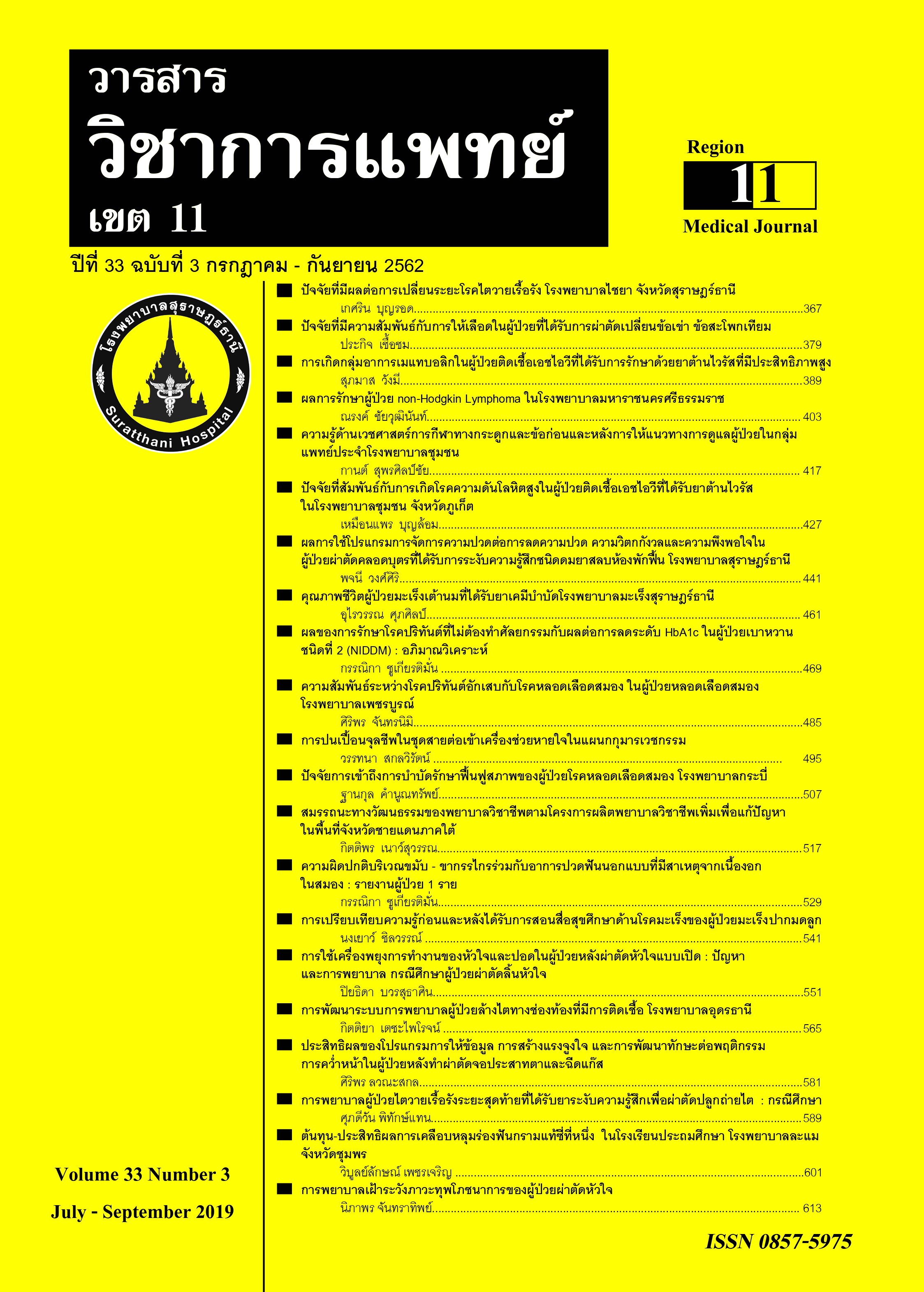Nursing care for monitoring of the malnutrition in patients cardiac surgery
Keywords:
nursing care, malnutrition, cardiac surgeryAbstract
Malnutritions are common in cardiac surgery patient under critical care. The pathophysiology of symptoms in pre-, during, and post-surgery are intercorrelated. Beginning with increased metabolism and inflammatory response in pre-surgery phase including decreased intestine-blood circulation can have effect to digestion and nutrient absorbtion dysfunction. In addition, Limitation of nutrition care in post-surgery phase causes insufficient basal energy intake leading to malnutrition in the patients. This malnutrition symptom is correlated to longer surgical wound healing, longer hospital length of stay, and increased mortality rate. Nurse have major roles in malnutrition assessment in pre-, during, and post-surgery in order to follow up the sign and symptoms of
malnutrition continuously as well as overall health outcome of cardiac surgery patients.
In this work, nutrition status of cardiac surgery patient under critical care; nutrition assessment in pre-, during, and post-surgery; daily dietary requirement assessment, and nurse’s role in nutrition status care were discussed in order to emphasize the importance of continuous malnutrition care as one of the nurse’s major roles.
References
Lomivorotov V, Efremov S, Boboshko V. Prognostic value of nutritional screening tools for patients scheduled for cardiac surgery. Interact Cardio vascular Thoracic Surgery 2013;16:612–618.
Ringaitiene D, Gineityt D, Vicka V. Impact of malnutrition on postoperative delirium development after on pump coronary artery bypass grafting. Journal
Cardiothoracic Surgery 2015;10:74.
Lopez-Delgado JC, Rio G, Flordelıs-Lasierra JL, and Putzu A . Nutrition in Adult Cardiac Surgery: Preoperative Evaluation, Management in the Postoperative Period,and Clinical Implications for Outcomes. Journal of Cardiothoracic and Vascular Anesthesia 00 (2019) 120.
Lenny MW van Venrooij, Rien de Vos, Mieke MMJ Borgmeijer-Hoelen, Cees Haaring, and Bas AJM de Mol. Preop erative unintended weight loss and low
body mass index in relation to complications and length of stay after cardiac surgery. Am Journal Clinical Nutrition 2008;87:1656–1661.
Perez Vela JL, Martin Benitez JC, Carrasco Gonzalez M. Clinical practice guide for the management of low cardiac output syndrome in the postoperative period of heart surgery. Medical Intensiva 2012;36:e1–44.
Esteve F, Lopez-Delgado JC, Javierre C, . Evaluation of the PaO2/FiO2 ratio after cardiac surgery as a predictor of outcome during hospital stay. BMC Anesthesiol 2014;14:83.
Hill A, Nesterova E, Lomivorotov V, Efremov S, Goetzenich A, Benstoem C, et .al. Current Evidence about Nutrition Support in Cardiac Surgery Patients—What Do We Know?. Nutrients 2018, 10, 597; doi:10.3390/ nu10050597
Weimann A., Braga M, Carli F, Higashi guchi T, Hubner M, Klek S, Laviano A, Ljungqvist O, Lobo DN, Martindale R, et .al. ESPEN guideline: Clinical nutrition in surgery. Clinical Nutrition. 2017.
McClave SA, Taylor BE, Martindale RG, Warren MM, Johnson DR, Braunschweig C, McCarthy MS, Davanos E, Rice TW, Cresci GA, et .al. Guidelines for the provision and assessment of nutrition support therapy in the adult critically ill patient: Society of critical care medicine (SCCM) and american society for parenteral and enteral
nutrition (A.S.P.E.N.). JPEN J. Parenter. Enter. Nutr. 2016, 40, 159–211.
Berger MM, Revelly J, Cayeux M, Chiolero RL. Enteral nutrition in criticallyill patients with severe hemodynamic failure after cardiopulmonary bypass. Clinical Nutrition. 2005, 24, 124–132.
Khalid I, Doshi P, DiGiovine B. Early enteral nutrition and outcomes of critically ill patients treated with vasopressors and mechanical ventilation. American Journal Critical Care. 2010;19:261–8.
Stoppe C, Whitlock R, Arora R, and Heyland D. Nutrition support in cardiac surgery patients: Be calm and feed on!. Journal Thoracic Cardiovascular
Surgery 2019;-:1-6
Stoppe C, Goetzenich A, Whitman G, Ohkuma R, Brown T, Hatzakorzian R, et .al. Role of nutrition support in adult cardiac surgery: a consensus statement
from an International Multidisciplinary Expert Group on Nutrition in Cardiac Surgery. Critical Care (2017) 21:131
รังสรรค์ ภูรยานนทชัย. การให้โภชนบำบัดในผู้ป่วยวิกฤต. สงขลานครินทร์เวชสาร 2549; 24(5) : 425-433
วรัทยา กุลนิธิชัย. การพยาบาลเพื่อติดตามเฝ้าระวังภาวะทุพโภชนาการอย่างต่อเนื่องในผู้ป่วยวิกฤต. วารสารพยาบาลโรคหัวใจและทรวงอก 2562; 30(1) : 2-16
Malone AM. Methods of assessing energy expenditure in the intensive care unit. Nutrition Clinical Pract 2002;17:21-28..
Berger MM, Blaser AR, Calder PC, Casaer M, Hiesmayr Mj, Mayer K, et al. Monitoring nutrition in ICU. Clinical Nutrition 2018; 30: 1-10.
Harris JA, Benedict FG. Biometric studies of basal metabolism in man. Publication 270. Washington DC: Carnegie Institution of Washington;1919.
Polymeropoulos E, Bagos P, Papadimitriou M, Rizos I, Patsouris E, Toumpoulis I. Vitamin c for the prevention of postoperative atrial fibrillation after cardiac surgery: A meta-analysis. Adv. Pharm. Bull. 2016, 6, 243
Lukas G, Davies AR, Hilton AK, et al. Nutritional support in adult patients receiving extracorporeal membrane oxygenation. Crit Care Resusc 2010; 12:230–4






